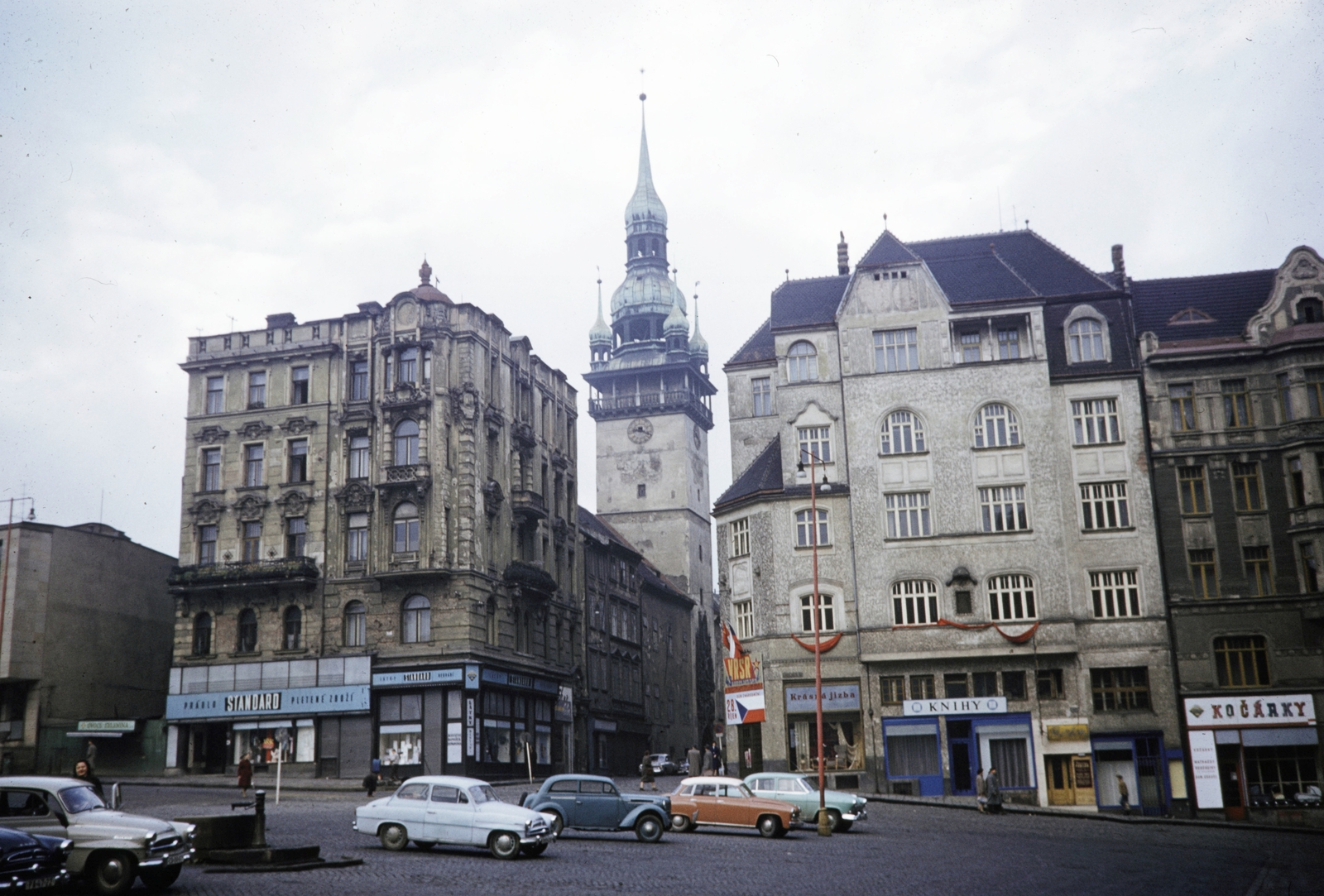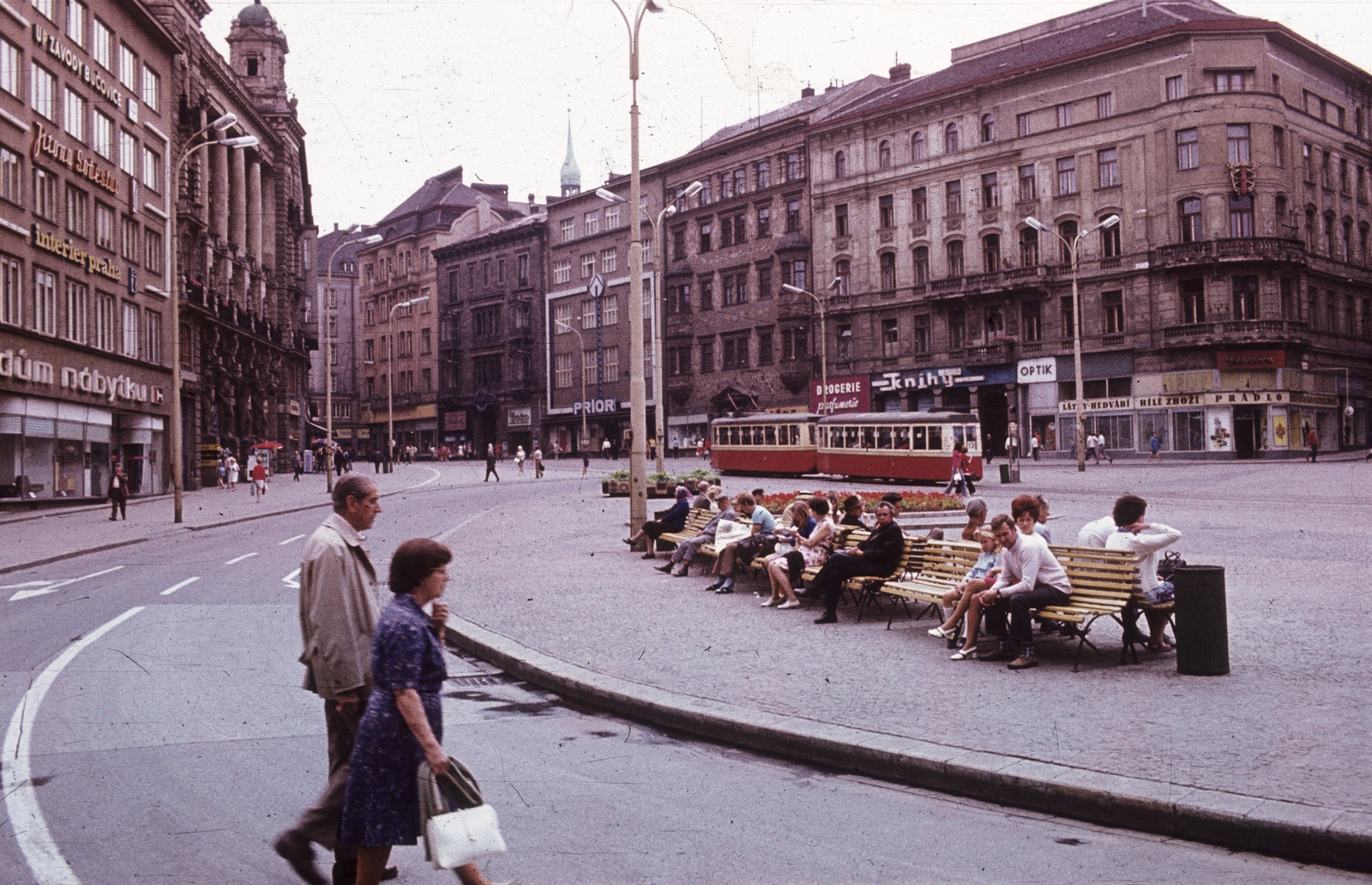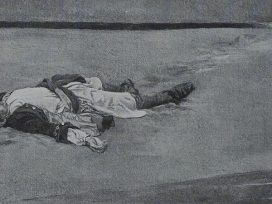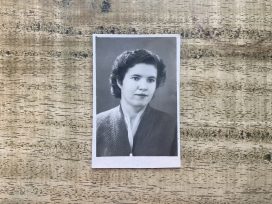Adam Reichardt: Although Milan Kundera was an internationally known writer with some ground-breaking books and essays, he was a very private person. You knew him personally. How would you describe Kundera, as a person, writer and colleague?
Samuel Abrahám: True, he was very private, but whoever knew him was struck by his humour and joie de vivre. He told us many funny stories about his beginnings in France, often making fun of himself, and he managed to catch you in his web of jokes, if unguarded. Above all, it was an amazing picture to see him and his wife Věra, who were so close and also intellectual peers.
I would not call myself a friend but someone with whom I could correspond and occasionally discuss things that interested us the most: philosophy and classical music. I have known Kundera since 2000. The reason I contacted him was quite ironic in retrospect. After the far-right Austrian politician Jörg Haider become part of the governing coalition, my friends at Eurozine decided to move the annual European Meeting of Cultural Journals from Vienna to Bratislava. Having just finished reading Kundera’s Betrayed Testaments, I suggested we invite Kundera as the keynote speaker, in order to make our unexpected event in Bratislava more attractive.
To entice him to reply, I added a review that I had published about his book of essays. Of course, this was still the age of faxes. To my shock, within a few hours, the machine was churning out a reply from Milan Kundera! He apologised that he wouldn’t come to Bratislava, explaining that he did not attend conferences or public events. Yet, he was really pleased with my review, writing that I highlighted so well the gist of his essay.
For me it was the beginning of a rich intellectual encounter with the great writer. After the fax ceased to exist in 2004 or 2005, he refused to have his own email address. So we corresponded through his wife. Sometimes he wrote and sometimes Věra would respond, quoting his messages. But we had a long correspondence, which often included Věra’s added words and thoughts.
This exchange lasted for a few years before my wife and I finally met him in person in Paris. At our meeting, I expressed my wish to translate those books that were written in French into Slovak. I argued that if they could be translated into Serbian, Slovenian and Japanese, then why not Slovak? He laughed at the idea that the Czechs would be forced to read his books in Slovak. A glass of good Armagnac sealed the deal.
The reason for this strange arrangement was that he did not allow his French books to be translated into Czech by anyone but himself. But then he added that he did not have time to do it, for he would rather write another book. Only recently did the Brno publishing house Atlantis start to translate his work into Czech and Slovak.

Brno, 1960. Image via Fortepan / UWM Libraries.
He didn’t trust any translator to translate his works into Czech?
There are some funny stories regarding this. He told me about when a Russian woman came to see them about translating one of his novels. After a very pleasant meeting they agreed. But when she sent the manuscript, he went through the translation and was horrified. And he told me, ‘You know, I hate to read Russian, but this translation was so awful that I had to read it and, in the end, I refused to let it be published.’
The experience made him very cautious about the translation of his texts into any language. How did he check the Korean or Indian translations? I have no idea. But he and his wife, who was his manager for many years, developed a great relationship with their publishers and, I guess, trusted them. Not long ago Věra wrote to me to say that the Czech translator Anna Kareninová, who is translating the novels, is excellent and that Kundera was pleased. He was quite ill for a while and at some point, he must have given up on the intention to translate his books into his native Czech himself.
Kundera never authorised a biography, which means we do not have a full insight into his life and experiences. Why was Kundera against this?
Kundera did not consider his life story important, only his texts. Moreover, only those writings he approved, like a composer designating opus numbers, were to appear in collected works. In that respect, as he wrote somewhere, he followed Gustave Flaubert, who also wished to be hidden behind the novel. Kundera once wrote that ‘everything I want to express is in my books … me as a person, I am not interesting.’ For example, he wrote of Hemingway, with some frustration, that more books were written and read about him than his books. This is what Kundera wanted to avoid.
There was a large biography written by an exile Czech author, Ján Novak, who wrote about Kundera’s life in Czechoslovakia before he left for France. The book was controversial and, after its publication, Věra Kunderová told me that she would not even show it to Kundera, who was quite ill by then. She was horrified that the book described Kundera’s relationship with his father in a very negative way, which would have hurt him. For, as Věra insisted, Kundera loved and adored his father. This is most likely why Kundera detested biographies – he knew that once they are written, they take on a life of their own.
Do you think there will be a biography now that he has passed away?
I am sure there will be many biographies. Apparently, the same author is now writing a second part, on Kundera’s life after he left Czechoslovakia. I really have no interest in reading those books; a couple of interviews with Novak were enough for me. More importantly, now that Kundera’s books are being translated into Czech (and Slovak), he is being rediscovered by the new generation. For now, it is only his novels, but I hope the translation of his profound essays will not take too long to publish. In fact, when we met, we discussed the possibility of me publishing his essays in Slovak. He twice gave me permission to publish his books, but after a few weeks he would call or write that he could not do it to his friends in Brno – Slovak being so close to Czech for him, and he felt they should appear first in Czech.
Kundera left Czechoslovakia in 1975 and relocated in France. Why do you think he made this decision? Had he finally given up hope after the failure of the Prague Spring and the Warsaw Pact invasion?
We should not forget what the 1968 Soviet invasion of Czechoslovakia meant to us. It was a tragedy, especially after all the hope of ’68. The 1960s slowly relaxed the atmosphere in Czechoslovakia, but it really sped up after the memorable Czechoslovak Writers’ Congress in 1967, which was organised by the editor of the Slovak cultural journal Kultúrny Život, Juraj Špitzer. Kundera wrote to me that Špitzer persuaded him to speak at the Congress. Even then Kundera was not keen on giving public speeches. But he agreed, and gave a memorable speech, like many others in attendance, including Václav Havel and Ludvík Vaculík.
The Congress was one of the most important intellectual events of the time. From that moment on, things sped up, leading to Alexander Dubček coming to power in January 1968. All of a sudden, there was an unexpected relaxation of censorship and initiation of reforms. Many communists who felt betrayed and who were imprisoned in the 1950s, but who were true communists, thought they could revive socialism. This was the origin of the expression ‘socialism with a human face’. There was a belief, most likely mistaken in retrospect, that socialism could be more humane, pluralistic and free.
The level of intellectual discourse within Czechoslovakia was incredible. Literary journals like Kultúrny Život and Litrerárni noviny had print-runs of over one hundred thousand per week. But of course, Russia, then the Soviet Union, could not allow this democratic commotion to succeed at the periphery of its vast empire. The reforms could have had a domino effect among other countries in the bloc. And so, on 21 August 1968, the Kremlin ordered half a million soldiers to occupy every village, every town of Czechoslovakia.
Although several people were killed, there was no military or violent resistance from the Czechs and Slovaks. Resistance took the form of peaceful defiance, solidarity and bitter humour. I remember how, as an eight-year-old, I would walk for hours with my sister around Bratislava. Within two or three days of the invasion, every window and every wall on the street was peppered with posters with jokes, caricatures and texts ridiculing the invaders. In the first few months there was incredible solidarity among the population, and the quisling government that Moscow hoped to install did not take over. There was still this great hope and amazing energy which emanated from the defiance of the whole population. It was a Gandhian resistance for almost six months.
But all those hopes and aspirations were eventually smashed. The Moscow-directed regime, led by Gustáv Husák and installed in 1969, gradually initiated political purges of anything related to the reforms of 1968. In particular, it targeted the intellectual elite and party members who supported the Prague Spring. Everyone who had some position was obliged to sign a humiliating letter stating that they agreed to the ‘brotherly help of the Warsaw Pact army’. Intellectuals who refused to sign were expelled and lost their jobs and status. They were forced to find manual work or live without work, although there were relatively few prison sentences.
One of the millions purged was Kundera. He couldn’t publish or teach and, like many Slovak and Czech intellectuals, was forced into internal exile and became an outcast. When he received an invitation to teach at the university in Rennes, he first went there officially. But when he published some books which the regime found unacceptable, he was stripped of his Czechoslovak citizenship and couldn’t return.
Interestingly, he did not become a member of the country’s dissident circles. Of course, he knew them well, it was a small community. His position to face the occupiers differed from the small group of dissidents, including Havel. In The Power of the Powerless, Havel described living in truth – a philosophical approach on how to resist the official lie by insisting on telling and living in truth, whatever the costs. Kundera found it rather dramatic and elitist and believed that an outcast must face the cynical communist regime through irony and humour.
Some dissidents found his approach rather superfluous and ineffective. So Kundera became isolated within a very intellectual circle. Besides, as Milan Uhde, Kundera’s friend and dissident, wrote recently: once Kundera’s books were published in France with great acclaim, there was much envy from among his fellow intellectuals.
One of Kundera’s most important pieces, which has had a profound impact, is the 1984 essay entitled ‘The tragedy of Central Europe’. This piece of writing gave an agency to our region during a time in which anything like that was being eaten away by Soviet-led communism. How relevant is Kundera’s essay from today’s perspective? Can we say that the region has overcome its kidnapping a generation after joining NATO and the European Union? How can we look at the essay through the lens of what is happening in Ukraine?
The essay was first published in the French journal Le débat in 1983. The original title was ‘The Kidnapped West’; it was the New York Review of Books that changed the title in 1984. Kundera was not very fond of the change because it altered the focus.
In the early 1980s, we never thought that we would live to see the end of the Soviet empire. Yet that was just a few years before its collapse. In the essay, Kundera castigated the West for giving up on its foundations, values, history and principles, saying that it had become complacent with the status quo. He tried to show how valuable Central Europe was, in its historical development, multicultural mosaic of languages, cultures, histories, philosophies, and that this part of the world was as ‘West’ as Berlin or Paris.
He was very disillusioned. Not only was the West giving up on Central Europe, but Central Europe was increasingly a premonition, an early warning of what could happen to the West. Kundera wrote that Europe did not even notice the end of its great cultural home, that Europe no longer felt its unity as a unity of culture. And that is why it was so easy for the West to give up on Central Europe. Kundera was saddened and alarmed by this.
That is why the essay was admired by so many western intellectuals who had similar concerns. What truly unified Europe? Was it just borders, regulations, bureaucracy and economy? And what had happened to the spiritual domain, how would Europe define its values, principles, culture or history? Kundera wrote in the essay that when he spoke to his French friends about this issue, they talked instead of TV shows or gossip.
After the fall of the Soviet Empire, the essay seemed to lose its purpose. The ‘Kidnapped West’ had been liberated. However, after 40 years of publication, it regains relevance. What unifies Europe now is the defence of Ukraine. Its defeat by imperial Russia would represent the defeat of that spiritual realm that Kundera was so fond of, and whose gradual demise he was so sad about. So, in that sense, I think his essay is still relevant today.
Paradoxically, when I asked Kundera in 2011 to allow his famous essay to be republished in the book Yet Another Europe after 1984, edited by the Lithuanian philosopher and MEP Leonidas Donskis, Kundera refused. He wrote me a long and rather apologetic letter explaining that he considered that essay ‘an occasional text’ (příležitostní) that belonged to the time but that should not be republished. So we dedicated the book to Kundera and his famous essay without including the essay itself. In fact, he refused to have it included in his collected works, published by Gallimard. It is a curious irony that just before Kundera passed away, Gallimard republished the essay under its original title ‘Kidnapped West’, along with his famous speech at the Czechoslovak writers’ congress in 1967. This is perhaps a sign of its relevance.
It certainly would be useful to re-read the essay with today’s perspective in mind…
The essay started an amazing debate not only in the West but also in Central Europe among intellectuals and dissidents. The debate centred on whether the region could re-emerge as a unit that had been divided and destroyed by the Soviet invasion. If borders became fluid and free again, many intellectuals asked in the late 1980s, what shape, what structure should Central Europe have?
This debate came to a sudden halt in January 1990, when the communist regimes fell. However, the creation of the Visegrád Group in 1991 by three dissident leaders – Havel, Antall and Wałęsa – was, to some extent, an homage to that tested and previously ‘kidnapped’ Central Europe. Renewed interest in that essay today is a sign that the debate on Central Europe is worth revisiting. Because Europe in the 1980s was a premonition of the fate of Ukraine today.
How will Kundera be remembered in this region and his home country, the Czech Republic?
A major conflagration surrounding Kundera has been taking place in his homeland since 2008, when he was accused by the Czech weekly Respekt of informing on someone in 1951. This person was returning from the West and living in a dormitory where Kundera also lived. I do not know whether Kundera did this or not – the evidence is very inconclusive – but the way in which the claims were presented was disgusting. The article was published without contacting Kundera and based on research done by someone who had a personal reason to exonerate his uncle.
Respekt published the issue on the day of the opening of the Frankfurt Book Fair, and the dossier was translated into English and distributed to the participants of the book fair. It was also sent out to high schools around the Czech Republic. Kundera was shocked and felt very hurt by this. I remember talking to him afterwards and he was totally distraught. ‘This is an assassination of an author!’, he exclaimed into the phone.
At first, I thought the weekly wanted to sensationalise the story for the sake of profit. But recently, Milan Uhde, a dissident and close friend of Kundera and Havel, revealed that in 1984 Havel organised a petition among the Czech dissidents to not have the Nobel Prize awarded to Kundera. Uhde wrote that had he had known that the petition was not just to support Jaroslav Seifert – who eventually won the prize – but was an ‘anybody but Kundera’ petition, he wouldn’t have signed it. Uhde found it very disturbing that this was done to Kundera by his friends, colleagues and fellow dissidents.
This revelation, together with the Respekt accusation, made Kundera very bitter. Evidently, the hostility between Kundera and Havel had been quite palpable – originating back in the 1960s. A few days after Kundera died, I corresponded with Věra. She wrote that they had really wished to have been able to come home, to spend their last years in Brno. But they couldn’t because of the accusation. I cannot confirm it, but she even suggested that Havel had been aware of the accusation concocted by Respekt in 2008. It is such a sad story that Kundera had to die in Paris, alone, despite his wishes to return to his beloved Brno.
What makes this tragedy even more sad is that for decades many of his books were not translated into Czech and Slovak, whereas the whole world could read them in hundreds of translations. It is only now that he is finally returning home as an author, intellectual and prophet of Central Europe, as another famous son of this liberated ‘Kidnapped West’ who died in exile. I hope that he will be cherished and discovered by each new generation, because there is so much to discover in his novels and essays and his thoughts. As with all classics, his work will have unique relevance for each subsequent generation.
Milan Kundera died on 11 July 2023 in Paris at the age of 94. He was born in Brno in 1929.








